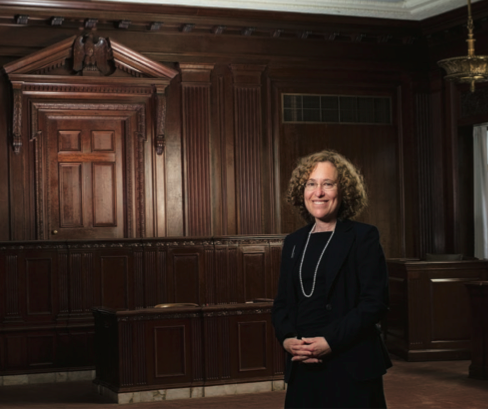
Cases like Brown v. Board of Education during the Civil Rights Era inspired Janet Hoffman to believe that an attorney, a judge and 12 open-minded jurors could effect great change.
Whether working as a law clerk, a public defender or one of Oregon’s premier criminal defenders, Hoffman has always been fascinated with using the Constitution effectively to protect people’s rights, even those facing sex-abuse allegations and those accused of multimillion-dollar white-collar crimes.
Since opening her criminal-defense practice in 1981, the 56 year-old has become the attorney people call when they find themselves in the biggest trouble of their lives. In one of the most significant white-collar-crime decisions handed down in Port- land’s federal court in the last decade, Hoffman prevailed when representing Flir Systems executive Kenneth Stringer (accused of falsely reporting revenue), proving that the government used “trickery and deceit” in building its case against him, violating Stringer’s rights. In light of her impressive record, it seems counterintuitive to think she’d be slightly superstitious (she won’t talk about Stringer because at press time the case was up for appeal and that might “beshry the luck”). But don’t be fooled—the fate of those she represents is not something Hoffman leaves to chance.
In the words of Multnomah Bar Association President Peter Glade, “When prosecutors face Janet on the other side, they must face the reality that she will not rest until she can get the best that she can for her clients.” And according to Hoffman, that is exactly what keeps her up pacing the floors at night. —SP
What’s the biggest misconception that people have about criminal law?
People will frequently say to me, “How do you feel about defending a rapist?” Or, “How can you handle this person who had child pornography?” And I think the misconception people have is that somehow if you’re guilty, you shouldn’t have a defense. If you start watering down constitutional rights or feeling some crimes are entitled to less-vigorous defense, well, it could be you who gets fewer rights or a less-vigorous defense someday.
How do you create a solid defense?
Quite often a corporation or individual has a story to tell, and if I can see how they saw that reality through their eyes, the defense is there. It’s just taking the time to understand what the human dynamic was that brought them in conflict with the law.
Can you give me an example?
I represented a Vietnamese man who killed a Korean at point-blank range. Our defense was that he’d been raised in the Vietnam War when Korean soldiers came into their village and killed people after displaying their martial arts expertise. So he thought when people got into certain stances, they were experts in the martial arts and that his life was in jeopardy.
Does your approach ever vary?
Sometimes the facts are totally against you, but you have the law there: You realize the police did an unlawful search, or they tricked someone into making a confession; they had bad evidence or a lying informant. In those situations it’s more about what the government did.
Is taking the Fifth Amendment code for “guilty”?
Everyone believes what you just said, but I am a total die-hard advocate that it is extremely important to not talk. The prosecution has the sole burden to prove their case. So you are entitled to be a spectator in that process, and if the government can’t find enough facts to prove the case they’re out of luck, so don’t add to the fact mix.
I’ve heard this work described as running from crisis to crisis.
Yes, you have to be an adrenaline addict.
Is that how you balance being a mother of two, a wife and a lawyer?
Three years ago. Christmas Eve. The kids have gone to sleep, and I get a phone call saying there’s a shooting and the police need me. So I leave my house on the 25th at 1 a.m., and I’m out all night with the police and get home in time for Christmas morning. But I loved that hiatus in the middle of the night, where I was in this milieu of crisis and helping people, and then I loved coming home, and so you balance the two and learn from both.
You must feel like you’ve been able to have it all.
Well, I’ve got wonderful, complicated cases; clients I really want to help; the kind of practice where every day is interesting; and I have adversaries who let me take the time off I need so my kids can say I wasn’t an absentee mother. I have everything but peace of mind. Think about it. You don’t want a lawyer who walks around with total peace of mind. I mean, I wouldn’t be doing my job.
